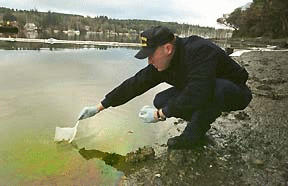A diesel spill fouled the waters of Eagle Harbor early Friday, leaving a wide petroleum sheen at the mouth of the Winslow ravine.
Islander Dodge Kenyon, a vessel inspector for the state Department of Ecology, reported the spill around 6:30 a.m. Friday. Kenyon said he noticed a strong smell of fuel as he rode his bike through Waterfront Park en route to the ferry.
“I said, ‘uh, oh, that’s a spill,’” he recalled. “I went down to the bridge, and I saw it.”
“It” was a rainbow sheen across the harbor waters, stretching along the shoreline from the lagoon to the public dock.
Much of the spill – the source of which remained a mystery Friday afternoon – was contained by workers from the Washington State Ferries yard, who ran a “sorbent boom” from the yard over to the park. A second boom was placed closer to the ravine, near the pedestrian bridge.
The call brought Coast Guard investigators over from Seattle, and a private contractor was called in for cleanup.
A four-man crew from the Seattle-based Ballard Diving and Salvage arrived in late morning and set to work on the tide flat, dabbing up the puddled diesel with absorbent pads.
“I’m not going to say it isn’t a big deal, but it isn’t a ‘major’ spill,” said Clint Cavender, Coast Guard investigator. “It’s controllable.”
Cavender said the elements favored a swift cleanup – the tide was still coming in, keeping the spill from spreading further into the harbor, while the sun made a surprise appearance to burn off the sheen through evaporation.
“It couldn’t be better,” Cavender said.
With pockets of fuel found lodged high in the rock bulkhead, investigators said the spill probably happened at high tide – 3:40 a.m. Friday – or just before.
By 2 p.m., crews had mopped up the spill as well as conditions allowed.
But the source of the diesel was still unknown.
Cavender and Kenyon used a motor launch to check out several barges and recreational vessels moored near the park, but their findings were inconclusive.
Funds for the immediate cleanup will come from the federal Oil Spill Liability Trust Fund, which is supported by a tax on imported fuel.
If the parties responsible for the spill can be identified, they can be billed for the cleanup, and may face additional civil penalties.
“Most of these remain a mystery, unfortunately,” said Glenn Sonntag, Coast Guard marine science technician.
“It may be that the government ‘eats it’ on this one,” he said. “But we’d prefer to find somebody.”


